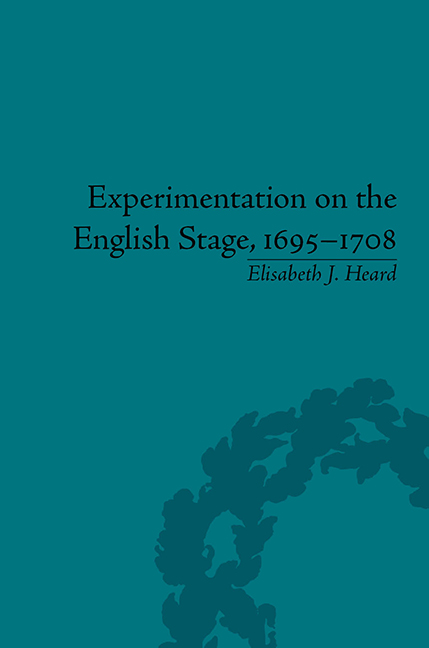Book contents
- Frontmatter
- CONTENTS
- Acknowledgements
- Introduction
- 1 The London Theatre World in the 1690s
- 2 Origins of ‘Humane Comedy’: Farquhar, Congreve, Cibber and Vanbrugh
- 3 Experimentation at the Turn of the Century
- 4 Successful Experimentation: The Recruiting Officer and The Beaux Stratagem
- 5 Farquhar's Contributions and the Post-1707 Theatre
- Conclusion: Farquhar and Anglo-Irish Drama
- Notes
- Works Cited
- Index
5 - Farquhar's Contributions and the Post-1707 Theatre
- Frontmatter
- CONTENTS
- Acknowledgements
- Introduction
- 1 The London Theatre World in the 1690s
- 2 Origins of ‘Humane Comedy’: Farquhar, Congreve, Cibber and Vanbrugh
- 3 Experimentation at the Turn of the Century
- 4 Successful Experimentation: The Recruiting Officer and The Beaux Stratagem
- 5 Farquhar's Contributions and the Post-1707 Theatre
- Conclusion: Farquhar and Anglo-Irish Drama
- Notes
- Works Cited
- Index
Summary
It is not often that we are given insight into how a writer thinks and feels about his craft, but in ‘A Discourse upon Comedy’, Farquhar reveals his opinions and frustrations with playwriting. Farquhar's struggle to perfect his writing to such a degree that it would be economically successful resulted in plays that endure long after his death, and they had a lasting impact on the rest of the eighteenth century and English theatrical history. After The Beaux Stratagem's initial run in 1707, the state of the theatre began to change. The union of 1708 decreed that all opera was to be performed in Vanbrugh's new theatre, Queen's Theatre in the Haymarket, and all plays (comedies and tragedies) were to be performed at Drury Lane. This move effectively ground the production of new plays to a virtual halt. With no more competition for the play-going audience, Drury Lane did not have to risk putting on works by new authors that may or may not be successful. They could rely on standard repertory favourites, thereby putting an end to the proliferation of humane comedies that had been flourishing in the past eight years. This is not to say, however, that there were no playwrights experimenting in their works, and in fact, the first few decades of the eighteenth century would see two significant humane comedies, Centlivre's Bold Stroke for a Wife (1718) and Steele's The Conscious Lovers (1722), and one testament to experimentation, Gay's The Beggar's Opera (1728). Farquhar's impact and the importance of experimentation resonates throughout the rest of the century and beyond, as playwrights continued to move into developing new forms of comedy that would speak to their audiences.
Farquhar's Theory of Comedy
As a playwright, Farquhar had both success and failure, and as an essayist he gives his readers insight to how he feels about writing comedies. On 22 November 1701, Lintott published Love and Business, a miscellany of Farquhar's poems, letters and prose writing. Included in this collection was ‘A Discourse upon Comedy’.
- Type
- Chapter
- Information
- Experimentation on the English Stage, 1695–1708The Career of George Farquhar, pp. 113 - 134Publisher: Pickering & ChattoFirst published in: 2014



